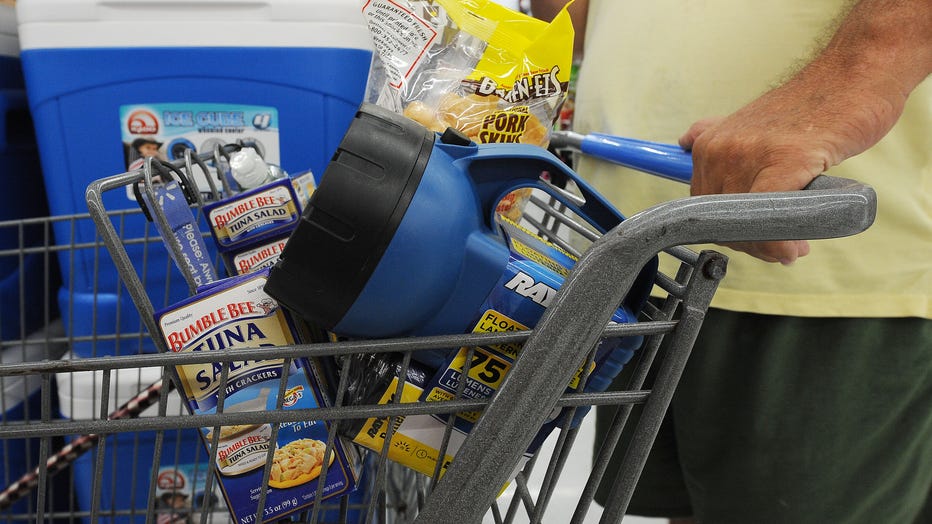Hurricane Henri landfall: Emergency supply list to help prepare
Millions of people in the U.S. Northeast are bracing themselves for the landfall of Hurricane Henri.
The National Hurricane Center issued an advisory late Saturday morning upgrading the tropical storm to a hurricane.
Storm surge, hurricane conditions and rainfall that could cause flooding are expected to begin as early as Saturday. Henri is expected to make landfall by Sunday afternoon.
Regardless of where it hits, broad impacts were expected across a large swath of the Northeast, extending inland to Hartford, Connecticut, and Albany, New York, and eastward to Cape Cod, which is teeming with tens of thousands of summer tourists.
Storm surge between 3 and 5 feet is possible from Flushing, New York, to Chatham, Massachusetts, and for parts of the North Shore and South Shore of Long Island, the hurricane center said.
Rainfall between 3 to 6 inches is expected Sunday through Monday.
RELATED: Hurricane Henri: State of Emergency declared in NYC, parts of NY as storm approaches
Officials in Massachusetts, Connecticut and New York cautioned that people could lose power for days. Outgoing Gov. Andrew Cuomo pleaded with New York residents to make last-minute preparations, warning that the storm could be as devastating as Superstorm Sandy in some parts of the state.
"We have short notice. We’re talking about tomorrow," Cuomo said. "So if you have to move, if you have to stock up, if you have to get to higher ground, it has to be today. Please."

Robert Manis of Mango, Florida shops for batteries, flashlights, canned food and other supplies in preparation for Tropical Storm Isaac, August 26, 2012 in Seffer, Florida, a few miles east of Tampa, site of the Republican National Convention (RNC).
Here's a basic supply list to prepare for when a hurricane is approaching.
Hurricane survival supply kit
To assemble your kit, store items in airtight plastic bags and put your entire disaster supplies kit in one or two easy-to-carry containers such as plastic bins or a duffel bag.
A basic emergency supply kit could include the following recommended items:
- Water (one gallon per person per day for at least three days, for drinking and sanitation)
- Food (at least a three-day supply of non-perishable food)
- Battery-powered or hand-crank radio and an NOAA Weather Radio with tone alert
- Flashlight
- First aid kit
- Extra batteries
- Whistle (to signal for help)
- Dust mask (to help filter contaminated air)
- Plastic sheeting and duct tape (to shelter in place)
- Moist towelettes, garbage bags, and plastic ties (for personal sanitation)
- Wrench or pliers (to turn off utilities)
- Manual can opener (for food)
- Local maps
- Cell phone with chargers and a backup battery
RELATED: FEMA 101: Everything you should know about getting help after a hurricane
Additional hurricane emergency supplies
Since Spring of 2020, the CDC has recommended people include additional items in their kits to help prevent the spread of coronavirus or other viruses and the flu.
Consider adding the following items to your emergency supply kit based on your individual needs:
- Cloth face coverings (for everyone ages 2 and above), soap, hand sanitizer, disinfecting wipes to disinfect surfaces
- Prescription medications
- Non-prescription medications such as pain relievers, anti-diarrhea medication, antacids, or laxatives
- Prescription eyeglasses and contact lens solution
- Infant formula, bottles, diapers, wipes, and diaper rash cream
- Pet food and extra water for your pet
- Cash or traveler's checks
- Important family documents such as copies of insurance policies, identification, and bank account records saved electronically or in a waterproof, portable container
- Sleeping bag or warm blanket for each person
- Complete change of clothing appropriate for your climate and sturdy shoes
- Fire extinguisher
- Matches in a waterproof container
- Feminine supplies and personal hygiene items
- Mess kits, paper cups, plates, paper towels, and plastic utensils
- Paper and pencil
- Books, games, puzzles, or other activities for children
For more information, click here to see FEMA's recommendations.
The Associated Press contributed to this report.


